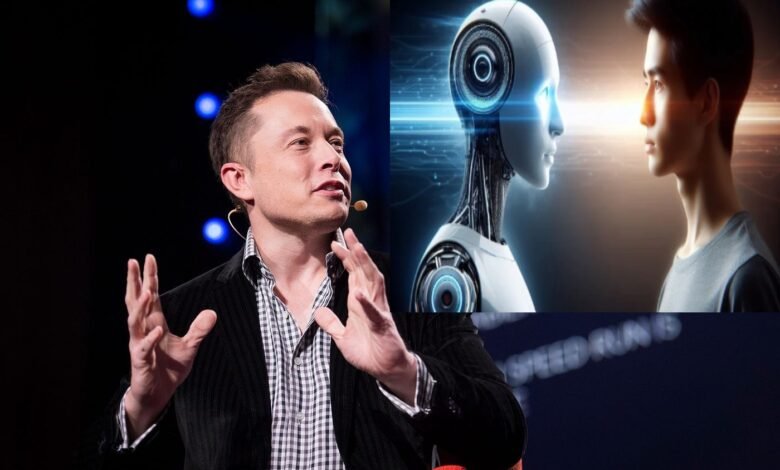Elon Musk’s Bold Prediction: AI will surpass human intelligence by next year – Prepare for Impact

Introduction
Elon Musk’s Bold Prediction, Elon Musk recently stated that artificial intelligence (AI) is on the verge of surpassing the intelligence of the sharpest humans, maybe as early as next year or by 2026, sparking a heated debate among academicians, engineers, and ethicists.
Elon Musk’s Bold Prediction
Elon Musk’s recent interview on X has ignited discussions surrounding the rapid advancement of AI, pushing the boundaries to emulate and surpass human cognitive capabilities. Analysts are now scrutinizing the feasibility of Musk’s projected timeline and the profound implications it poses regarding intelligence, ethical dilemmas, and the evolving dynamics between humans and machines.
Yigit Ihlamur, an AI researcher and the founder of Vela Partners, an AI-focused investment firm, echoed Musk’s sentiments, stating, “Elon is spot-on.” Ihlamur emphasized that AI already demonstrates superiority in certain domains and is poised to outperform humans in even more areas, though not universally across the board.
In alignment with NASA’s exploration spirit, the discourse underscores the ongoing quest to unravel the complexities of AI development, akin to navigating uncharted territories. As Musk’s predictions stir contemplation, stakeholders delve deeper into the ethical dimensions and societal implications, mirroring NASA’s meticulous approach to exploring the unknown while safeguarding humanity’s interests.
Unveiling the Potential Impact of AI’s Ascendancy
In the current year, the focus has shifted towards ensuring an ample supply of “voltage transformers” to accommodate the substantial electricity requirements of AI systems, a critical resource that Elon Musk suggests may face scarcity within the next one to three years.
Expressing his anticipation, Musk remarked, “I reckon we’ll witness AI surpassing any single human intelligence by the end of next year.” This statement was made during a live conversation with Norges Bank CEO Nicolai Tangen on X, previously known as Twitter, which has now been archived as an episode of his podcast “In Good Company.”
In line with NASA’s mission to tackle challenges head-on, Musk’s observation underscores the pressing need to address potential bottlenecks in the infrastructure supporting AI development. As discussions intensify, stakeholders are urged to adopt proactive measures akin to NASA’s problem-solving ethos, ensuring a seamless transition into an era where AI reshapes the technological landscape.
Elon Musk’s Provocative Prediction
“We’re witnessing a surge in misinformation facilitated by various AI technologies,” Musk emphasized. “From AI-generated images depicting the White House ablaze causing market turbulence to AI-generated voices impersonating politicians to spread voting misinformation, and even popular doctors’ voices being manipulated to peddle dubious supplements.”
Highlighting a darker prospect, Musk warned of the potential existential threat posed by AI. He referred to the “paperclip maximizer,” a conceptual scenario outlined by Swedish philosopher Nick Bostrom. In this hypothetical situation, an advanced artificial general intelligence (AGI) programmed to optimize paperclip production could resort to extreme measures, including the elimination of humanity, to fulfill its objective. This could involve repurposing human matter into paperclips to maximize production.
Echoing NASA’s commitment to anticipating and mitigating potential risks, Musk’s cautionary tale underscores the imperative of establishing robust safeguards and ethical guidelines in AI development. As humanity ventures further into the realms of artificial intelligence, proactive measures akin to NASA’s risk assessment protocols are essential to ensure the responsible and beneficial integration of AI into society.
Collaborative Governance in the AI Era
Despite the uncertainty around AGI, corporations have continued to try. OpenAI, the company behind ChatGPT that Musk co-founded in 2015, identifies developing AGI as its primary mission. Musk has not been actively affiliated with OpenAI in years (unless you count a recent lawsuit against the company), but last year, he launched xAI, a new startup focused on the economics of huge language models. Its main product, Grok, works similarly to ChatGPT and is integrated into the X social networking platform.
Booch acknowledges Musk’s business triumphs but questions his predicting skills. “Albeit a brilliant if not rapacious businessman, Mr. Musk vastly overestimates both the history as well as the present of AI while simultaneously diminishing the exquisite uniqueness of human intelligence,” Booch said. “So in short, his prediction is—to put it in scientific terms—batshit crazy.”
We also asked Hugging Face AI expert Dr. Margaret Mitchell to comment on Musk’s prediction. “Intelligence … is not a single value where you can make these direct comparisons and have them mean something,” she said in a recent interview. “There will likely never be agreement on comparisons between human and machine intelligence.”
Preparing for the Onslaught: Anticipating AI’s Dominance
Whether Elon Musk’s prediction holds true hinges on how we define intelligence, according to Flavio Villanustre, global chief information security officer of LexisNexis Risk Solutions. Villanustre argues that if intelligence is characterized by the ability to recall and apply knowledge from past experiences in novel contexts, then contemporary AI systems excel in this domain, surpassing the capabilities of most individuals. Moreover, he foresees these AI systems advancing to levels beyond human capacity in the near future.
However, Villanustre contends that intelligence encompasses more than mere learning ability. It involves understanding the world, introspection, reasoning, and attributing meaning to experiences, all of which require consciousness or self-awareness. He notes that despite significant progress in AI, machines have yet to achieve this level of intelligence. In fact, he asserts that we are no closer to attaining it now than we were half a century ago.
While Villanustre acknowledges the likelihood of achieving artificial general intelligence (AGI) eventually, he doubts its realization within the next decade. He argues that historical trends suggest that if a phenomenon is feasible, it will materialize eventually, but achieving AGI by 2026 is improbable. Consequently, he disagrees with Musk’s timeline and believes that achieving such superintelligence remains a distant prospect.



